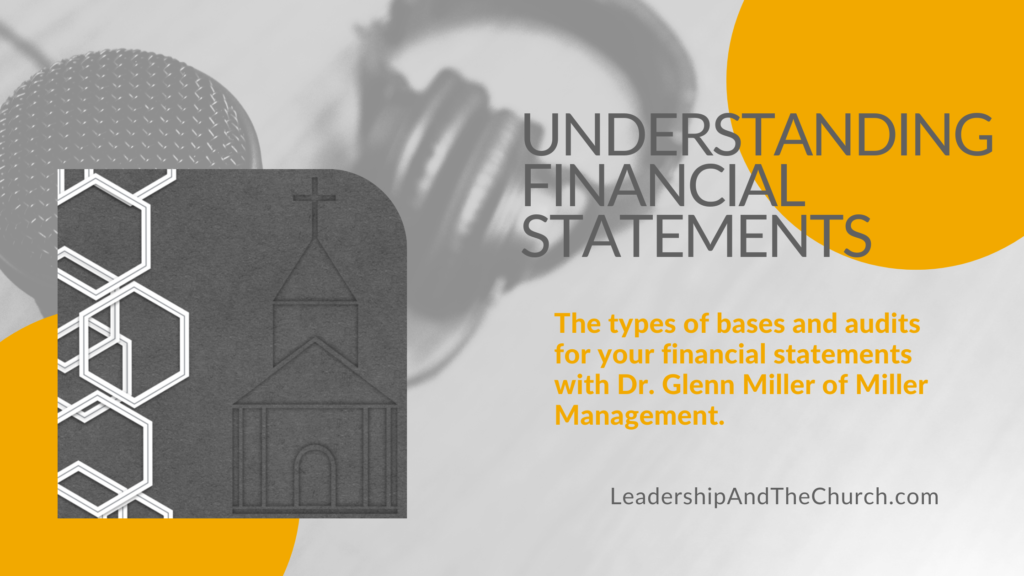Glenn Miller, CEO of Miller Management, is the guest of this week’s episode. He is interviewed by his colleague, Chris Miller, President of Miller Management.

Why is it important to have well prepared financial statements? And why do we need to know how to read and understand those financial statements as a non-financial person? Those are just some of the questions we will answer over the next few episodes.
Last week’s episode was about the benefit of hiring outside help. Today’s episode is focused on what format a church should be using for your financial statements. Wait, there are multiple types? Yep! Listen in to hear the multiple types and what they each mean…
Types of Bases
There are three different types: Cash Bases, Modify Cash Bases, or Full Accrual Bases.
Cash may be the easiest to understand. Modified is similar, but you can spread a payment out over several months even when if one check was written. Whereas Accrual is when the transaction incurred, not when it came out. All three are valid and they all have their advantages and disadvantages. So which does MM prefer? Modified-Cash Basis.
“The thought that one system over another either increases or decreases the probability of fraud is actually not true at all. There are no national statistics that show that fraud happens in one more than the other.” – Dr. Glenn Miller
Depreciation
Can use depreciation on all three, but it is considered a non-cash expenses. But it does show up in your expenses. It can be a tax right off for for-profit companies, but much less important for non-profit organizations.
Required is some industries, like education. But it’s main goal is to fund deferred maintenance.
How do you choose?
So how do we chose which bases? We recommend you put your format your reports best for management needs: boards, lay-leaders, or leadership. The acid test of good reports is can the average non-accountant person read and understand your reports? The second consideration is outside needs: banks, denominations, or other regulatory agencies.
Churches are not required to any type of bases, but your governing board may have a say, so you need to make sure you are following that.
The simplest approach is cash bases. Money in, money out. No need for complicated journal entries. And for the most part, boards should be able to easily understand the value of the company.
Audits
For your Cash or Modified-Cash Bases, your Audit options are Compilation and/or Review. The only way to get a full GAAP (Generally Accepted Accounting Practice) Audit is if you are on an Accrual Bases. This will require a CPA to test your books.
Three types of Audits: Compilation, Review, Full GAAP Audit
Compilations have the lowest level of assurance. The easiest tests to look for accuracy. And the least expensive. May be the least useful. Any accounting firm, CPA firm, or bookkeeper, or almost anyone can assemble the information.
Review have the middle level of assurance. Can only be purchased from a CPA firm. Some testing and questioning happen. They put together an assessment of how valid the numbers are. Reviews are healthy and good, and moderately priced. But it’s still the middle level.
Full GAAP Audit is the highest level, and the most expensive. Look at the numbers, and the bank statements, look at checks, do significant testing. To determine if the numbers they were given were accurate. Only a CPA firm can perform these audits, and with this full audit, they can give their opinion. In general, this is a fair representation of the financials.
The problem with these types of audits is that people use these as anti-fraud measurers. Even a clean audit can still have fraud occurring inside the organization. That is not the purpose of an audit. An audit may find fraud, but that is not their intended purpose.
Are audits needed?
Depending on the size and scope and internal controls of each organization, will determine that answer. If you have an outside firm producing your financials, your need should be less. If the board requires them, no matter what, there is your answer.
One of the purposes of Miller Management is to work on the preventative side. If we can prevent fraud or bad accounting practices to happen in the first place, your organization is at a much better level on the front end. Rather than trying to play catch up at the back-end, after the fraud occurred.
Coming Up
Financial Statements and using them well is very important for ministries. Understanding your financial position is a very important part of stewardship.
Join us next week as we continue our series on Reading and Understanding Financial Statements – how we use these statements.
Join the conversation, see behind the scenes, and learn more on our Instagram and Twitter.
Special thanks to our guest, Glenn Miller, and our masters of all things Podcasting, Chris and Lauren Miller, for this second episode in our Understanding Financial Statements series.
